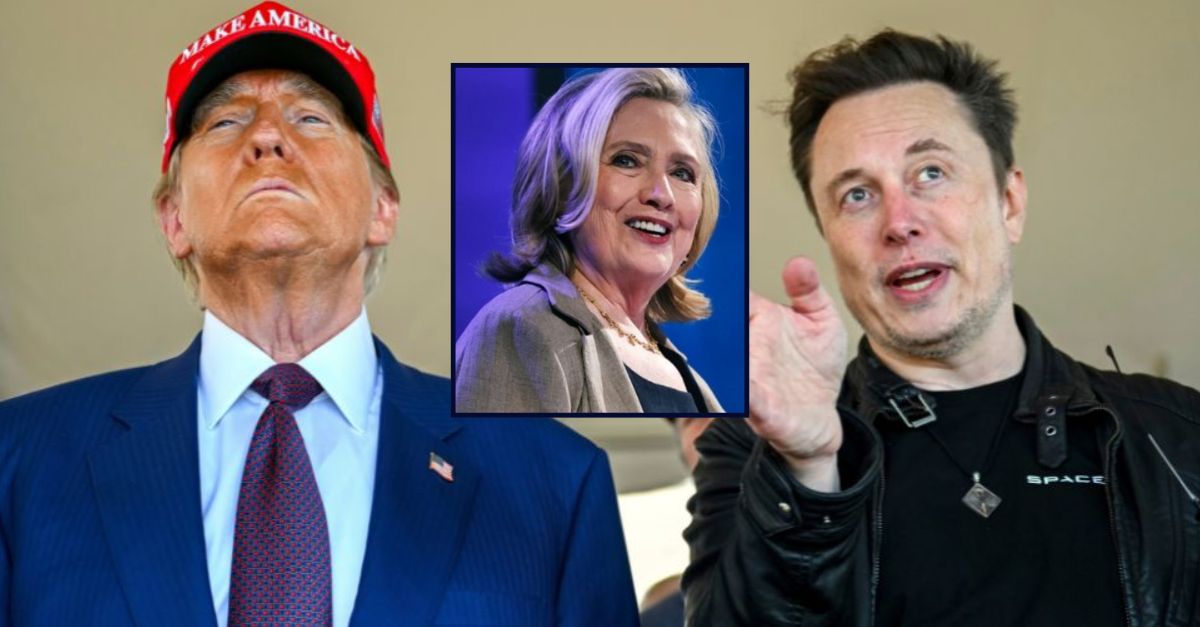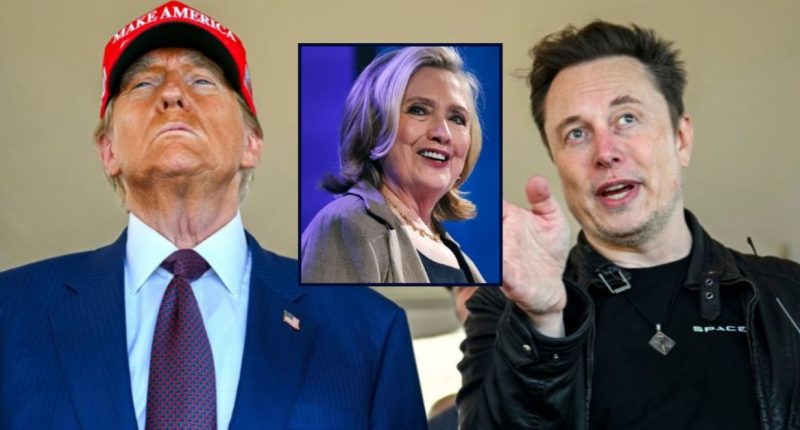
Inset center: Hillary Clinton at an event in New York City on Sept. 19, 2022 (Spencer Platt/Getty Images). Background: President-elect Donald Trump listens to Elon Musk as he arrives to watch SpaceX’s mega rocket Starship lift off for a test flight from Starbase in Boca Chica, Texas, Nov. 19, 2024 (Brandon Bell/Pool via AP, File).
The U.S. Department of Justice is pushing back against a legal challenge to Elon Musk’s role in the Trump administration by likening him to Hillary Clinton, Karl Rove, and John Podesta.
On Feb. 13, New Mexico and 13 other states filed a lawsuit in Washington, D.C., federal court over the constitutional legitimacy of Musk and his Department of Government Efficiency (DOGE) with an iteration of the exact same argument that spelled doom for onetime special counsel Jack Smith in the Mar-a-Lago documents case.
This argument was explicitly tied to the concurrence penned by Supreme Court Justice Clarence Thomas in the landmark opinion creating presidential immunity for criminal acts. Just as U.S. District Judge Aileen Cannon used the concurrence to squelch Smith’s authority and dismiss the case against Trump with a novel reading of the U.S. Constitution’s Appointments Clause, New Mexico and the other states hoped to put Musk out to pasture as well.
The government says the plaintiffs’ read is entirely off-base.
“By the Complaint’s own terms, the States agree that Elon Musk ‘does not occupy an office of the United States’; they allege only that he wields ‘de facto power,”” a motion to dismiss filed Friday reads. “That should be the end of this ill-conceived challenge.”
The heart of the plaintiffs’ case relied on two sections of the Appointments Clause. The first section requires the “advice and consent of the Senate” to appoint principal officers. The second section offers an exception for the appointment of inferior officers – if Congress has “established by Law” that the president can appoint them without Senate confirmation.
“In other words, when there is no law addressing the appointment of an inferior officer, the principal-officer procedure applies; only the President can nominate the officer, and appointment requires the advice and consent of the Senate,” the states’ lawsuit reads.
And Musk, the plaintiffs allege, wields “virtually unchecked authority.” This is far too much power to fit into the exception, the lawsuit claims.
More Law&Crime coverage: ‘Unlike anything we’ve ever seen before’: Watchdog group tells judge DOGE is ‘black box’ of secrets as agency claims its exempt from FOIA requests
The Trump administration disputes this analysis.
“The Appointments Clause is concerned with one thing: the actual exercise of formal government authority,” the motion to dismiss continues. “It is designed to ensure that, when Congress creates an office with certain legal power, the person holding that office and exercising that power has been selected and approved in an appropriate and politically accountable manner. Where a person neither holds an office nor wields its de jure authority, the Appointments Clause has nothing to say.”
To hear the government tell it, Musk does not actually have any kind of formal office within the government – so the Appointment Clause simply does not apply to him.
“The States’ argument fundamentally misunderstands the Appointments Clause,” the motion to dismiss continues. “On their view, the Court’s focus should be not on the powers imbued in the office a person occupies but on whether the particular person has wielded significant power. But that conflates formal authority and informal influence, hard power and soft.”
President Donald Trump, for his part, recently referred to Musk as the “head” of DOGE in a joint session of Congress. That admission has since cropped up in several lawsuits challenging or seeking to clarify Musk’s authority. Relatively belatedly, the state plaintiffs in the present case put Trump’s words about Musk into the record as well. The motion to dismiss does not account for that recent filing.
Love true crime? Sign up for our newsletter, The Law&Crime Docket, to get the latest real-life crime stories delivered right to your inbox.
In the motion, the DOJ also takes issue with the states for their Justice Thomas citation – arguing his concurrence had to do with the question of whether the former special counsel “had a valid office.”
The government insists the states wholly misapprehend Musk’s role in the 45th and 47th president’s administration.
“Nobody thinks, for instance, that the White House Chief of Staff or White House Counsel are officers in any fashion, despite the fact they exercise tremendous influence across the government,” the motion to dismiss goes on. “This is because they do not occupy a position that is equipped with any formal authority. And without that, there is nothing that implicates the Appointments Clause.”
This argument is sketched out, by way of examples, at length:
The States’ contrary view rests on conflating influence and authority. They say, in effect, that others in the Executive Branch listen to Mr. Musk and his allies. But treating that as triggering a constitutional need for Senate confirmation would constitute a remarkable and untenable change in law. The White House has long been populated by aides and advisors who wield tremendous de facto sway over government. Hillary Clinton was charged with reforming the nation’s healthcare system; Karl Rove designed much of the Bush Administration’s domestic policy. Rahm Emanuel, Don McGahn, and John Podesta were no wallflowers. Chiefs of Staff, White House Counsels, and other senior advisors are often declared the “most influential” people in D.C., based solely on their soft power. But that has never given rise to an Appointments Clause problem, because none of those persons held any legal office or authority.
On the merits, the states cannot win, the government says – while imploring the court to ignore the merits and rule against them for lack of standing to sue in the first place.
“The States marshal many grievances about both Mr. Musk and DOGE’s broader initiatives; but absent from these general objections is a single allegation showing an actual or imminent injury suffered by the States,” the government’s motion reads. “Instead, at every turn, the States complain about possible injuries that might happen in the event the Defendants take certain contemplated actions.”
Still, the DOJ offers a fulsome rubbishing of the states’ arguments.
“[O]n the States’s own telling, Elon Musk has massive (perhaps even decisive) influence over the DOGE-related portfolio of domestic policy,” the motion to dismiss reiterates. “But the one thing he lacks is the one thing that the Appointments Clause requires: an office, ‘established by Law,’ and vested with formal power to act as an ‘Officer of the United States.’ That dooms the States’ constitutional claim.”




